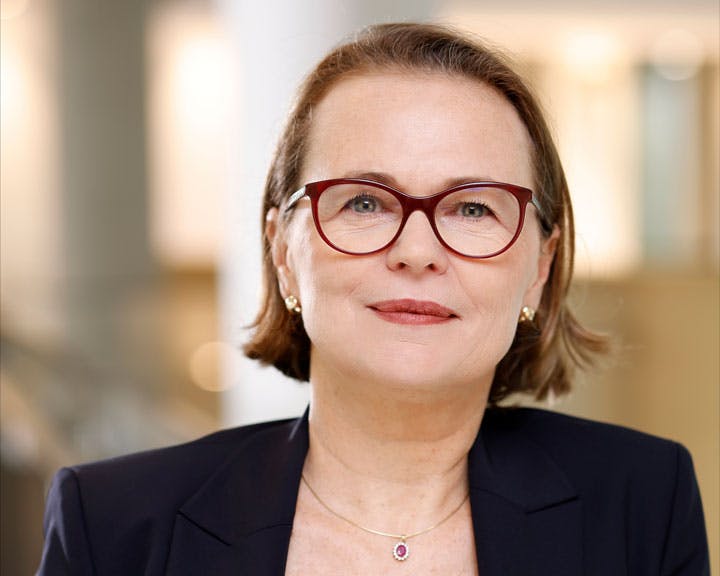On 12 January 2024, the GRTgaz Board of Directors did me the great honour of appointing me to the position of Chief Executive Officer of the GRTgaz group. I am proud to follow in the footsteps of Thierry Trouvé, who guided the company through many challenges and achievements over nearly 11 years to prepare it for the future.
This legacy, and the events of the past year, illustrate the importance of dialogue with our stakeholders at several levels in order to establish ever more firmly the key role of infrastructure and molecules in leading our country towards carbon neutrality.
Starting with dialogue with our gas shipper customers in order to manage the disruption caused by the war in Ukraine. In 2022, France had legitimate anxieties about the approaching winter of 2023… These fears have dissipated, the gas system has demonstrated its resilience and a kind of peace has been restored in the gas markets, which enabled us to look ahead to winter 2024 under more favourable conditions. This is partly down to the installation of eight floating LNG import terminals in Europe, including the one connected to Le Havre by GRTgaz, together with the national effort to achieve long-term energy sobriety. The Ecogaz programme, supported by over a hundred public and private operators, has helped to reduce consumption by nearly 20% between 2021 and 2023.
Then there is the dialogue throughout the past year with the French Energy Regulation Commission (CRE) and our shareholders to set a new tariff for the use of the transmission network. Valid for the next four years, this is always an important exercise that involves finding the right balance between what is needed, expected performance levels and affordability for our customers. As a result, though the tariff is rising by an average of 19% from 1 April 2024 due to the significant drop in predicted subscriptions and the end of several long-term commitments, the impact on bills for an average consumer will be limited to around €17 excluding tax in 2024.
Thirdly, dialogue with industry and local authorities accelerated in 2023 to help infrastructure projects emerge for hydrogen or CO2 transmission. Most of these projects were selected by the European Commission to be awarded the Project of Common Interest (PCI) label in 2024, recognising their role in achieving the European Union’s climate goals. This acceleration was felt even more strongly in terms of CO2 logistics. We operate in the Dunkirk, Saint-Nazaire, Fos-sur-Mer and Seine valley industrial areas. Abroad, we are beginning work with our Belgian and Norwegian partners on how to connect industries in France whose processes, such as steel or cement production, generate fatal CO2 emissions, to storage sites in the North Sea.
At the same time, we are making progress in our dialogue with the public authorities to define technical standards and practical operating guides relevant to the development of these new sectors. With the strength of its research centre, GRTgaz is uniquely positioned in Europe in terms of resources to manage the logistics of these new energy vectors.
Of course, we are continuing our dialogue with national and European legislators on the texts that will have an impact on the energy transition and the regulation of the hydrogen and methane markets. In France, the government has taken several very practical steps to relaunch the anaerobic digestion sector. All these measures align with an ambitious trajectory for the sector in the French Strategy for Energy and the Climate (SFEC) project, amounting to 44 TWh by 2030. The adjustments to the French hydrogen strategy revealed in late 2023 also send a positive message to our industry, with recognition for the role of infrastructure and imports. At European level, 2023 was devoted to preparing for the fourth European gas package, which includes regulation for the hydrogen market that is broadly based on the current provision for natural gas.
Dialogue has also been ongoing with the electricity transmission operator, RTE. It is high time the network operators worked together to develop a shared vision and shared planning. RTE and GRTgaz conducted the first joint study to assess the issues involved in hydrogen development. It emerged that the primary usefulness of hydrogen transmission infrastructure is to connect hydrogen basins with storage to offer optimum flexibility for the electricity grid, with benefits that greatly exceed the cost of this infrastructure.
Quality of dialogue is a priority, including internal dialogue between GRTgaz teams, and this is bearing fruit in two essential areas: accidents and methane emissions. With only four occupational accidents resulting in absence, GRTgaz achieved one of its best results over the last 15 years. Another headline objective is controlling our methane emissions. These emissions have been falling steadily since 2016: by 2023, they were four times lower than in 2016, in line with our target of a fivefold reduction by 2024.
Finally, our dialogue with civil society was renewed with the establishment of a new Stakeholder Council (CPP). GRTgaz acts in line with its corporate purpose and promotes the integrated management of its financial and nonfinancial performance. As a result, the time had come for far-reaching changes to our CPP to ensure it better reflects society’s expectations of us. The new council will be more closely associated with corporate governance, deepening the dialogue with the Board of Directors and the Executive Committee.
It falls to us to pursue and amplify this dialogue still further with the agricultural, waste disposal and academic worlds, and with everyone we work with successfully to develop reliable new solutions that are technologically and economically accessible in order to transform our energy system.


